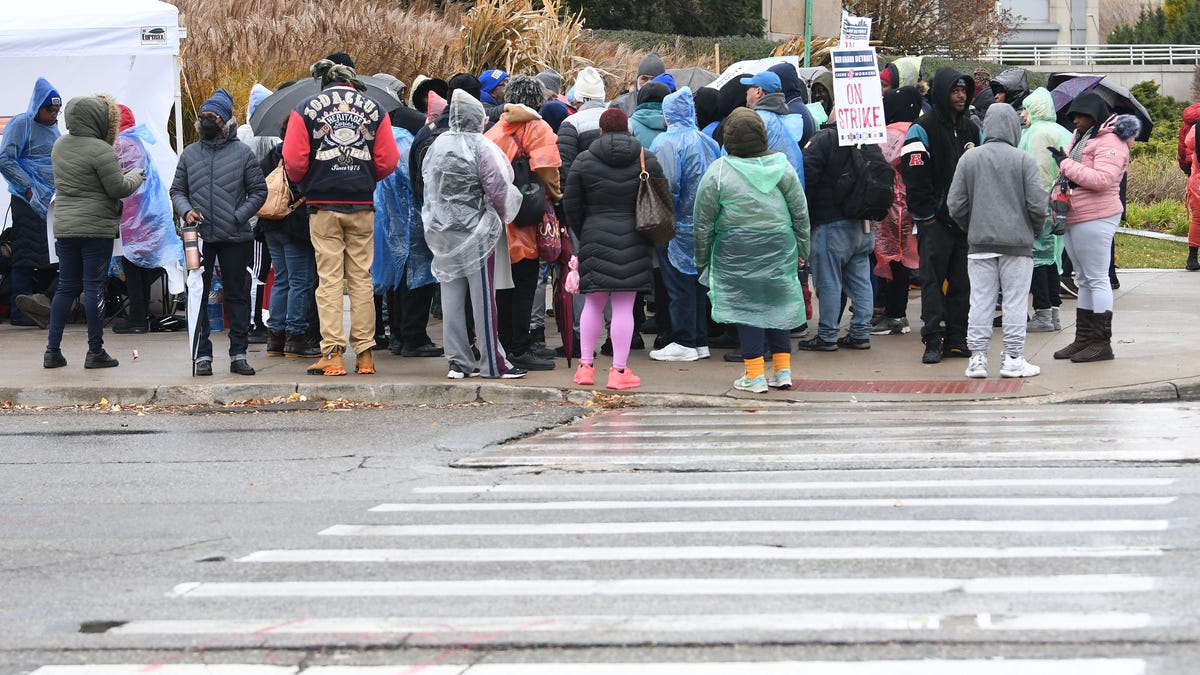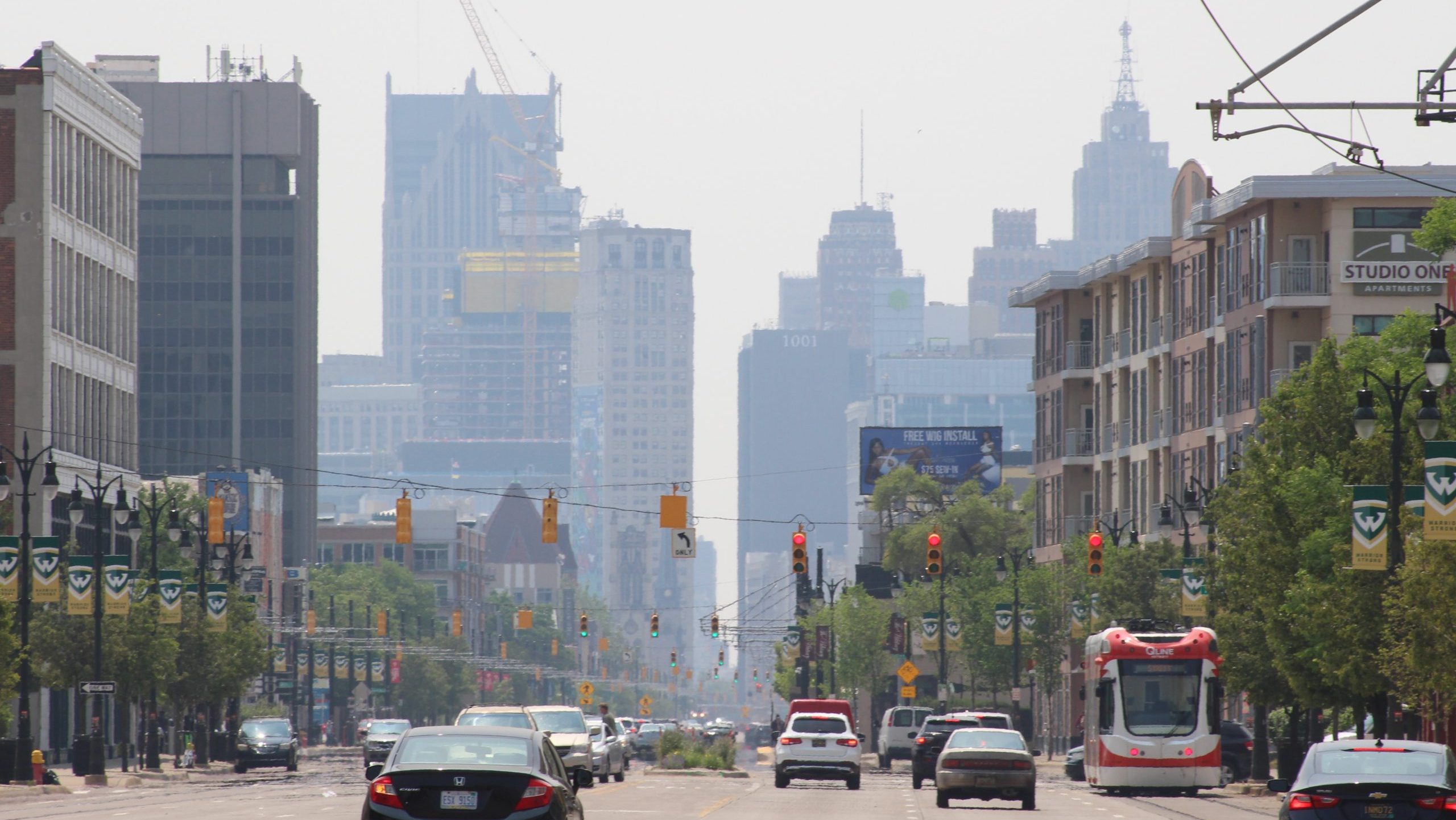Detroit, MI
Workers at two of Detroit’s three casinos ratify contract, end strike

Detroit — Roughly 2,800 workers at MotorCity Casino and Hollywood Casino at Greektown have voted to ratify a new contract, ending a 34-day strike at the two properties, while those at MGM Grand Casino rejected the proposal and are continuing to strike.
The workers are members of the Detroit Casino Council, a union that represents 3,700 employees of Detroit’s three casinos. Membership at each casino voted separately on the offer. Those who voted to ratify the five-year contract will receive an immediate $3-an-hour raise and a $5-an-hour total raise over the course of the contract, according to the union.
The ratified contract also comes with workload reductions, technology protections, a 401(k) employer match program, and no health care cost increases.
Members of the Detroit Casino Council walked off the job Oct. 17 after negotiations to reach new contracts failed. The strike followed heavier workloads during the COVID-19 pandemic and rising inflation, the council said in a news release. The workers, which include dealers; cleaning staff; food and beverage staff; valets; and engineers are sought wage increases, job and health care protections and reduced workloads.
The immediate raise, which represents an average of 18% for workers, is “the largest wage increases ever negotiated in the history of the Detroit casino industry,” a release by the council said.
The contract ratified by union members at Greektown and MGM casinos also includes technology protections that guarantee workers will receive advanced notice when new technology affecting jobs gets introduced. Under the new contract, training for new jobs created by technology is also required, as well as health care and severance pay for employees laid off as a result of new technology.
The Detroit Casino Council is made up of five unions: the UAW, Unite Here Local 24, Teamsters Local 1038, Operating Engineers Local 324 and the Michigan Regional Council of Carpenters.
The council announced that a tentative deal had been struck on Friday.
John Drake, vice president and general manager at Hollywood Casino at Greektown, has said the casinos appreciate “the productive and respectful negotiations with the DCC and are eager to welcome back our team members as soon as possible.”
hmackay@detroitnews.com

Detroit, MI
Detroit smoke shop shut down for selling marijuana without license

DETROIT – A smoke shop on Detroit’s east side is shut down by the city after police say the business was caught selling marijuana without a license.
Vapes on Pointe on Warren Avenue had an orange sign across its door, sealing it shut.
Police say the shop was brought to their attention after community members reported a minor was sold marijuana at the establishment.
“My great nephew came up here and made some purchases, (he’s) 14 years old,” said Deboraha Underwood. “Weed, edibles, vape pen.”
Underwood got police and community activists involved.
“Our Vice unit did a subsequent investigation and was able to purchase some marijuana items from this location, at which time we made some arrests, executed a search warrant, and had to effectively close down the building,” said Detroit Police Commander Jevon Johnson.
Community activist Teferi Brent works with a group raising awareness about shops selling tobacco or marijuana products to minors.
“The police did the right thing in responding immediately,” said Brent.
Brent said this is the fifth shop they’ve helped police shut down.
“There may be 500 more,” Brent said. “If that’s what it takes to get these people to stop selling poison to our children.”
–> Activists rally against tobacco shops selling to minors in Detroit
Copyright 2024 by WDIV ClickOnDetroit – All rights reserved.
Detroit, MI
'Heat island effect' contributing to warmer temperatures in Detroit, study shows – WDET 101.9 FM

As global temperatures continue to rise due to climate change, environmental factors in some urban communities are amplifying the heat even further.
Heat islands are defined as urbanized areas that experience higher temperatures than more rural areas due to the prevalence of buildings, roads and other infrastructure that absorbs and re-emits the sun’s heat more than natural landscapes such as forests and water bodies.
In 2023, the nonprofit Climate Central found that the urban “heat island effect” is elevating local temperatures by at least eight degrees Fahrenheit in 44 U.S. cities — including Detroit — exposing residents to higher risks of heat-related illness and higher cooling costs. In some cities, like Chicago, New York City and San Francisco, the effect can boost temperatures by 10 degrees or more, the organization reported.
Subscribe to The Metro on Apple Podcasts, Spotify, NPR.org or wherever you get your podcasts.
Jen Brady, a senior data analyst at Climate Central, joined The Metro on Friday to explain the heat island effect and offer suggestions for how to cool down urban communities in metro Detroit. She says many factors can contribute to the heat island effect, including the way a city is designed.
“Sometimes it’s just the design of the city, how the city grows. Detroit is an old city with lots of old buildings, old structures, stone structures left of pavement. So it may just be how the city has grown over the years,” Brady said. “A lot of northern cities are actually designed to hold heat in because we think of the cold weather in the winter. And we want to hold that heat in. But now that’s becoming a problem.”
Planting more trees in urban landscapes, having green roofs, and painting roofs and pavement lighter colors could help to reduce the heat island effect, Brady says, but emphasized that there must be a joint effort within the community to see real results.
“Because the other thing is, if you have a whole neighborhood, it’s very warm, and one person lightens the roof, it’s not going to really lighten the whole neighborhood. So, it really needs to be a big collective effort,” she said.
Many nonprofits and municipalities in the U.S. are already working towards warding off scorching temperatures by planting trees. Right here in Detroit, the nonprofit The Greening of Detroit plans to plant 70,000 trees over the next five years, which can help scatter the heat and provide more shade.
Use the media player above to hear the full interview with Brady.
More headlines from The Metro on May 17, 2024:
- Today marks 70 years since the U.S. Supreme Court’s Brown v. Board of Education decision. Terah Chambers, the associate dean for Michigan State University’s College of Education, joined the show to discuss how the landmark case has affected the education system and its future direction.
- A group of metro Detroiters sent a letter to Gov. Gretchen Whitmer and Detroit Mayor Mike Duggan this week asking them to revisit ideas for the future of I-375 in downtown Detroit. Their concerns included a lack of community engagement, vision, safety, urban design, and restorative justice for those affected by the freeway’s original construction. Michigan Department of Transportation senior project manager Jon Loree joined the show to provide a response to the negative feedback from residents about the project.
- According to a new study from Michigan State University, many U.S. workers find the jobs available to them boring. WDET’s Bre’Anna Tinsley spoke with Kevin Hoff, lead researcher on the report, about what can be done to help bridge the gap between the workforce and the work.
- The Detroit Women of Comedy Festival is taking place this Friday and Saturday at the Planet Ant Theatre in Hamtramck. The show’s producer, Kate Holmes, joined the show to share more about the unique event.
Listen to The Metro weekdays from 11 a.m. to noon ET on 101.9 FM and streaming on-demand.
Trusted, accurate, up-to-date.
WDET strives to make our journalism accessible to everyone. As a public media institution, we maintain our journalistic integrity through independent support from readers like you. If you value WDET as your source of news, music and conversation, please make a gift today.
Donate today »
Detroit, MI
Updated Lions Salary Cap after Massive Extensions

The Detroit Lions have had quite the busy offseason.
They’ve added a multitude of players at positions of need, including cornerback Carlton Davis III via trade and EDGE Marcus Davenport, defensive lineman D.J. Reader and offensive lineman Kevin Zeitler in free agency.
Plus, they’ve inked franchise quarterback Jared Goff (four years, $212 million) and All-Pros Penei Sewell (four years, $112 million) and Amon-Ra St. Brown (four years, $120 million) to massive contract extensions. Goff’s multi-year extension, which includes a staggering $170 million in guaranteed money, is the richest contract ever handed out by the Lions.
Headed into the 2024 season, Sewell is set to make the highest average annual salary for an offensive lineman ($28 million a year). Meanwhile, St. Brown sits at No. 2 among receivers in average annual value at north of $30M per season ($30,002,500).
As a team, the Lions, per Over the Cap, will enter the upcoming season with $203,015,317 in salary committed to their 51 most expensive players (the 22nd-highest salary in the NFL). Plus, the organization possesses the fourth-most cap space in the league ($31,096,540).
Additionally, Detroit currently owes $23,056,507 in dead-cap money (the 17th-highest number in the league).
To no surprise, Goff – with a cap hit of $27,211,832 – is set to cost the most against the Lions’ salary cap in ‘24.
Let’s take a look now at the 10 players that will incur the biggest cap hits for Detroit this upcoming season (numbers from Over the Cap):
1.) QB Jared Goff – $27,211,832
2.) LT Taylor Decker – $19,100,000
3.) C Frank Ragnow – $12,800,000
4.) CB Cam Sutton (released) – $12,680,000
5.) EDGE Aidan Hutchinson – $9,740,015
6.) RT Penei Sewell – $8,167,885
7.) LB Alex Anzalone – $7,444,118
8.) RB David Montgomery – $6,786,765
9.) OL Kevin Zeitler – $5,940,000
10.) DL D.J. Reader – $5,303,000
-

 Politics1 week ago
Politics1 week agoRFK Jr said a worm ate part of his brain and died in his head
-

 World1 week ago
World1 week agoPentagon chief confirms US pause on weapons shipment to Israel
-

 World1 week ago
World1 week agoConvicted MEP's expense claims must be published: EU court
-

 News1 week ago
News1 week agoStudents and civil rights groups blast police response to campus protests
-

 Politics1 week ago
Politics1 week agoCalifornia Gov Gavin Newsom roasted over video promoting state's ‘record’ tourism: ‘Smoke and mirrors’
-

 Politics1 week ago
Politics1 week agoOhio AG defends letter warning 'woke' masked anti-Israel protesters they face prison time: 'We have a society'
-

 News1 week ago
News1 week agoNine Things We Learned From TikTok’s Lawsuit Against The US Government
-

 Politics1 week ago
Politics1 week agoBiden’s decision to pull Israel weapons shipment kept quiet until after Holocaust remembrance address: report


















